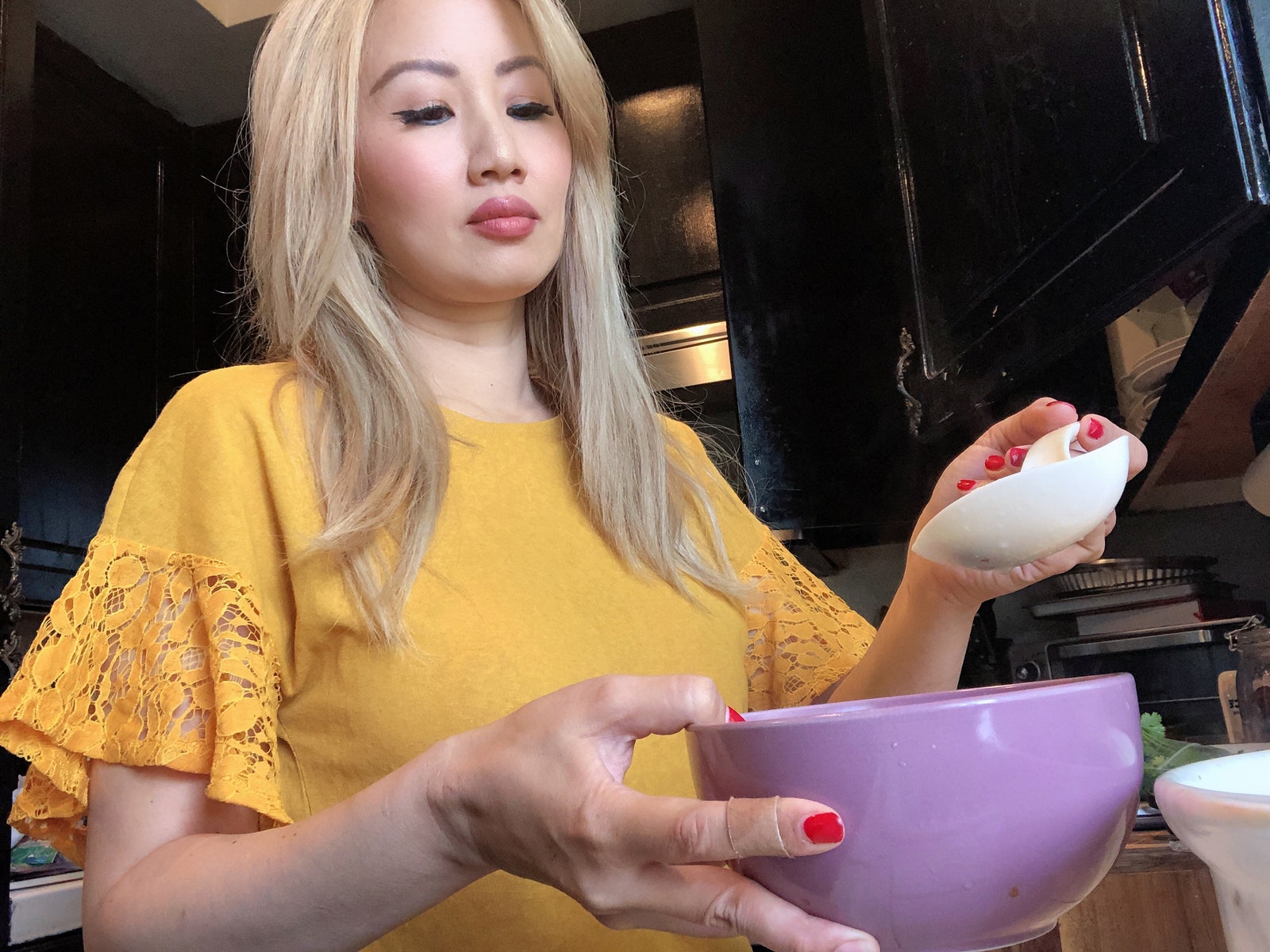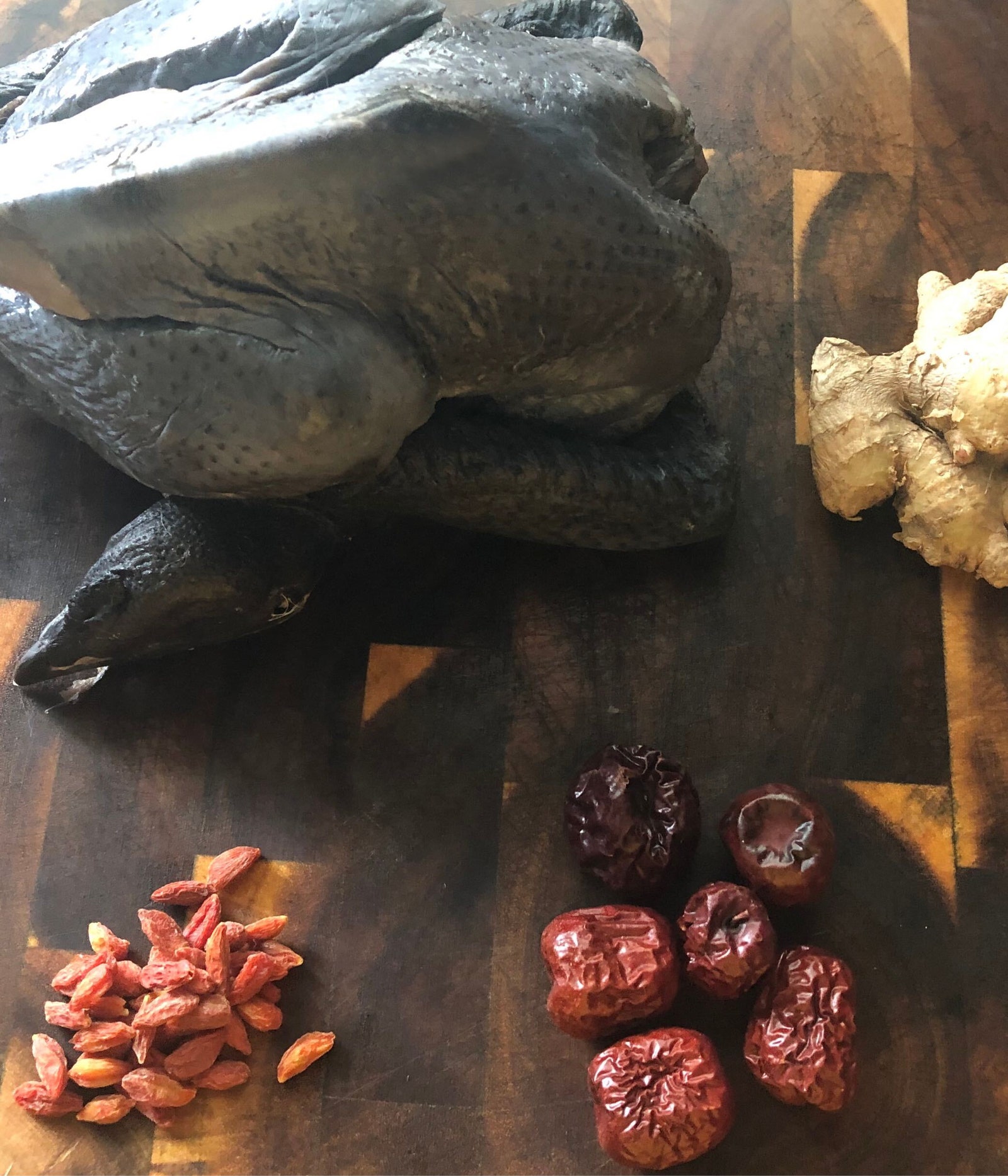Tradition, identity, and food collide as one woman grapples with a hard truth.

I Cooked Chinese Postpartum Cuisine to Hide the Fact That I Didn't Want Kids
One night when I delivered a pot of sesame oil chicken—a classic Chinese postpartum dish—to my brother and sister-in-law, they asked if I wanted to hold their newborn baby, a.k.a. my niece.
I knee-jerked an immediate “no.”
Did I actually resent my niece, this perfectly innocent little being? I wondered the next morning, as I hovered over a chicken and ginger congee bubbling fiercely on the stovetop. The answer to that question may have been in the pot. Indeed, the steam enflamed the burning guilt of my childlessness and failure to be a “good” Taiwanese daughter. In that sense, cooking for my sister-in-law felt more like penance than a good deed.
Known in Chinese as zuo yue zi or “sitting the month” (坐月子), the Chinese postpartum confinement practice is widely considered miserable, akin to imprisonment. Because Chinese culture believes new mothers are susceptible to cold air (which leads to sickness), they are instructed to quarantine at home for 30 days and eat a regimented “warming” diet. This includes ginger, chicken, pig's feet, liver, and more.
“My favorite dish to make was geung cho—pigs feet and ginger stew,” says Kaila Yu.
The Chinese believe that ‘chi’ a.k.a one’s ‘vital life force’, is carried in your blood. Since childbirth brings significant amounts of fluid and blood loss, you lose chi and this causes your body to go into a state of yin (cold). Chinese traditional medicine believes that when your yang (hot) and yin are out of harmony, it leads to medical issues.
Yuezi isn’t cheap. At Meal4Mom, a local Chinese meal service in Temple City, California, the pricing for prepared meals for the month starts at $2,280 for 30 days.
My mother stressed that as the sole aunt, I must present an impressive baby gift for the new parents. Because I’ve never wanted kids myself it was hard to get inspired shopping for diaper cakes and strollers. It was only when I heard my brother say that prices for Chinese postpartum cooks were outrageous that I knew it was the perfect gift idea.
My mother was the most excited about my yuezi project and I turned to her expertise as she walked me through obscure herbal Chinese ingredients. My niece would be her first, and perhaps only grandchild. The baby was a blessing that was long overdue. Most of my younger cousins were having their second kid already. A proper Taiwanese daughter would feel guilty for refusing to fulfill this dream for her.
I cooked my grandmother’s congee recipe and her version is packed with extra ginger, considered to be a warming ingredient, ideal for new mothers. Ginger is quite pungent when fresh, but it becomes sweeter when cooked. Similarly, as I nourished my sister-in-law with ancient yuezi recipes, and cared for my niece by proxy, my desire to nurture her grew.
Week one of yuezi is focused on detoxification. After birth, the Chinese believe that lochia (postpartum bleeding) and expulsion of toxins must be helped along with ingredients such as liver, wood ear mushrooms, and roasted licorice root.
The very first dish that I made for yuezi was Sheng Hua soup, an herbal concoction consisting of Pao Jiang, Carthamus Tinctorius, Chinese angelica, Semen Persicae, lovage root, and roasted licorice root. The recipe is simple but requires attention: First, soak the herbs in three cups of water for 30 minutes then boil until it reduces to one cup of liquid. Repeat the process with a second set of herbs. Finally, mix the two cups of liquid together to serve.
The strong herbal flavor is also strangely sweet while bitter at the same time. My sister-in-law dutifully choked it down each morning. We bonded while enveloped in a cloud of warm peppery-spiced fumes in the morning. Ginger’s sharp scent inspires focus and it made me aware of my subconscious feelings of insecurity about my place in the family, emotions that I didn’t even know that I had.
Silkie chicken, which is used in black chicken herbal soup.
My stance towards pregnancy is unequivocal, I’m horrified by the idea of breastfeeding, stretch marks, the idea of having your legs up in a stirrup as a team of doctors and nurses stare intensely at your nether regions. And having a baby is not like in the movies. When my niece was born, my sister-in-law wasn’t handed a freshly washed, cherubic baby wrapped up nicely in a blanket. Instead, shortly after exiting her womb, my niece was unceremoniously plopped on her chest, sans blanket, bloodied and dripping with slime.
Giving birth is damn traumatic on the body. It makes sense that week two of yuezi is all about ‘warming’ and repairing the body.
Week three started with black chicken herbal soup, believed to regulate a new mother’s hormones and aid in kidney and liver functions. The appearance of black chicken aka silkie chicken can be disturbing, it’s black from the skin down to the bones.
The soup is easy to make, one of the main ingredients is just time. After blanching the chicken, add ginger, angelica root, goji berry, red dates, milkvetch root, lovage root, rice wine, sesame oil, and water. Just let it simmer for 45 minutes and the healing soup is ready to go.
As I chopped, sautéed, and braised the warming ingredients, my heart began to fill with affection for my niece. As I recalled her all wrapped up like a dumpling and the earnestness on my brother's face as he held her out towards me, I almost burst into tears.
The next time I dropped off food, I made a beeline for my niece and cradled her in my arms. There really is something about that new baby smell. It’s the scent of innocence and hope.
My favorite dish to make was geung cho—pigs feet and ginger stew. It’s one of the most well-known dishes of yuezi and is believed to increase the milk supply and I served it during the fourth week of yuezi. When the pigs feet arrive from the grocer, they are rock hard, you can’t imagine that they’ll be transformed into something meltingly tender and unctuous. But with time, the lowly pigs feet transform into a succulent masterpiece, slipping easily off the bone. My brother remarked that it was the best geung cho he had ever tasted.
To paraphrase renowned chef Éric Ripert's comments in a 2017 interview, “When food is prepared with love, the people who eat it can feel that…you can feel the love in the food."
As I spent my month in quarantine immersed in this strange project, I realized loving my niece doesn't make my life decisions wrong. The more I chopped, sautéed, and braised, the more I began to feel a warming of my own affections for my niece, and those feelings of guilt of not being the perfect daughter slowly vanished.
Yuezi is supposed to warm the new mother but it also melted this cook's icy heart.
Kaila Yu is a journalist based in Los Angeles.
This story originally appeared on: Glamour - Author:Kaila Yu

























